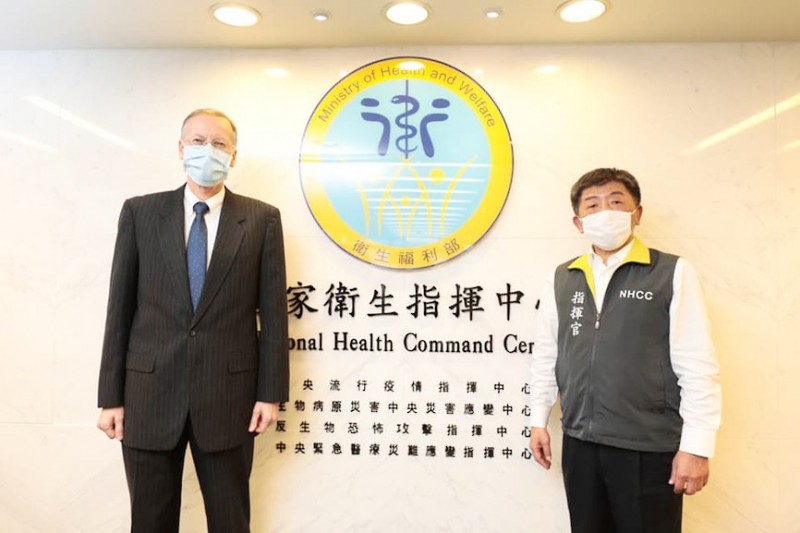《TAIPEI TIMES》 New reporting criteria for virus cases announced

American Institute in Taiwan Director Brent Christensen, left, and Minister of Health and Welfare Chen Shih-chung, who heads the Central Epidemic Command Center, are pictured at the Ministry of Health and Welfare in Taipei yesterday. Photo courtesy of American Institute in Taiwan
By Lee I-chia / Staff reporter
The Central Epidemic Command Center yesterday released a set of revised criteria for reporting suspected COVID-19 cases, while also announcing its guidelines for disclosing patients’ personal information.
The center said that its advisory specialist panel revised the definition for “severe pneumonia with novel pathogens” — COVID-19 infection — by expanding the criteria needed to report suspected cases.
Minister of Health and Welfare Chen Shih-chung (陳時中), who heads the center, said that physicians should report people for testing if they meet one of three clinical conditions: They have a fever, acute respiratory infection, or a lack of smell or taste; there is a clinical, radiological or pathological diagnosis of pneumonia; or the patient is suspected of having community-acquired pneumonia, but has no history of recent overseas travel.
“A lack of smell or taste is a new symptom added to the definition,” he said.
Chen added that doctors should also report people for testing if they meet one of three epidemiological criteria: They have had close contact with an infected person, including caring for them, spending time with them or being exposed to their bodily fluids; a cluster of cases occurred near the patient; or one of the first two criteria occurred in the 14 days before the patient experienced symptoms, visited or lived in another country, or had close contact with people from a country with cases of fever or respiratory symptoms.
“Generally, we hope that when doctors see a local patient that meets any of the criteria and the possibility of a COVID-19 infection cannot be excluded, they would send the patient for testing,” Chen said.
Asked about speculation that a lack of smell or taste might be associated with a mutated coronavirus strain in Europe, center advisory specialist panel convener Chang Shan-chwen (張上淳) said that a lack of smell or taste was not reported by people infected earlier, most of whom returned from China, but that several infected people returning from Europe or the US have reported it.
Panel experts suspect that a lack of smell or taste might be related to a mutation, but so far there is no scientific evidence to confirm their suspicion, he added.
Only 31 of 329 infected people (9.4 percent) reported the symptom, Chang said.
Some patients have reported a lack of smell and taste, while some have only reported a reduced sense of smell or taste, but the panel has so far not determined from observation of these cases how long the symptoms might last.
People have asked what information can be shared about infected people, so the center reviewed its regulations — including the Freedom of Government Information Act (政府資訊公開法), the Communicable Disease Control Act (傳染病防治法) and the Special Act on COVID-19 Prevention, Relief and Recovery (嚴重特殊傳染性肺炎防治及紓困振興特別條例) — and established guidelines for handling patients’ personal information, Chen said.
“The general guideline remains unchanged: We will only publicize patients’ information if it benefits the nation’s disease-prevention efforts,” he said.
Generally, an infected person’s age group, gender and residential area — city or county — as well as which public transportation they rode or public places they visited, and the types of people they came into contact with — such as a family member they lived with or a healthcare professional who treated them — would be disclosed, Chen added.
The person’s name, information from medical records, occupation or job title, as well as their place of work — private company or government sector — and hospital would typically not be made public, he said.
新聞來源:TAIPEI TIMES

















